|
|
|
Sort Order |
|
|
|
Items / Page
|
|
|
|
|
|
|
| Srl | Item |
| 1 |
ID:
113277
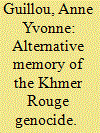

|
|
|
|
|
| Publication |
2012.
|
| Summary/Abstract |
This article contrasts the ways in which the memories of the Khmer Rouge genocide have been constructed at different levels and at different periods since the 1980s. Various actors have been involved in this construction, such as the ruling Cambodian People's Party, the Khmer Rouge Court sponsored by the United Nations since 2007, and Cambodian villagers. This has led to numerous misunderstandings and discrepancies regarding the trial of the former Khmer Rouge leaders. The current research is based on ethnographic fieldwork undertaken in a village in the province of Pursat. It shows how the villagers have taken care of the human remains from the state-sponsored memorials and of the mass graves (that is to say, of the unknown bodies). The article shows how the Khmer popular religious system is instrumental in forging a memory of the dead of the Pol Pot regime and in healing social suffering.
|
|
|
|
|
|
|
|
|
|
|
|
|
|
|
|
| 2 |
ID:
113276
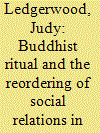

|
|
|
|
|
| Publication |
2012.
|
| Summary/Abstract |
This paper examines the resilience of local Cambodian kinship and village communities in the aftermath of devastating violence. These communities are explored as cross-cutting sets of exchange relationships between local community residents, community members and their urban relatives, lay people and Buddhist monks, and the living and the dead - in the context of the annual phchum ben ceremony, or 'festival of the dead'. The phchum ben ceremony is an act of 'social resilience' in the spirit of this special issue; the ritual is an act of mourning, a demonstrative activity expressing grief, and a process to restore the disrupted social relations between the living and the deceased ancestors, especially those who died during war and the reign of the Khmer Rouge in the state known formally as Democratic Kampuchea (1975-79). The ritual focuses on community cohesion, as most rituals do, and social networks are enacted, recreated and displayed; by participating, people declare their membership of various social groups. The paper emphasizes that, in the contemporary economic and social context, the ritual is also about enacting and proclaiming social hierarchy, highlighting the gap between wealthy and powerful (now often urban) family members and their poor and dependent rural cousins.
|
|
|
|
|
|
|
|
|
|
|
|
|
|
|
|
| 3 |
ID:
113279
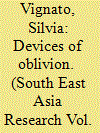

|
|
|
|
|
| Publication |
2012.
|
| Summary/Abstract |
Since the peace agreement has put an end to the 30-year-long civil conflict in the province of Aceh in Indonesia, poverty, parental loss, lack of opportunities and an old tradition have caused a growing number of Acehnese girls and boys to spend between three and ten years in residential Koranic schools [dayah or pesantren]. There, they process their experience of the conflict, be it direct or indirect. In this article, thanks to ethnographical data, the author explores this labour of transformation. An idea of resilience which is culturally based in local societies is analysed. Key issues are the difference between personal and social resilience, plus the transformations that a resilient process enhances in the very culture from which it stems. The dayah have proved very effective structures in facing the needs of the poorest Acehnese children. Nevertheless, the author argues, they tend to shape the children according to a general model that can create exclusion and crystallize pre-existing psychic suffering. This paper indicates that different visions of trauma and memory characterize different parts of the same society, and that selecting one or another is a political choice that is embedded in international policies.
|
|
|
|
|
|
|
|
|
|
|
|
|
|
|
|
| 4 |
ID:
113275


|
|
|
|
|
| Publication |
2012.
|
| Summary/Abstract |
This paper addresses the recovery in Thailand after the 2004 Indian Ocean tsunami. The country worst affected by the tsunami was Indonesia, while in Thailand about 8,000 people were assumed dead. In all the countries affected more females were killed than males. Disasters test the strength of a society's structures and relationships, and this paper focuses on the interplay between gender, vulnerability and social resilience. It provides an overview of social resilience as a concept and theory and discusses vulnerability and resilience in disaster situations. The paper is based on findings from a long period of anthropological fieldwork, which included interviews with survivors and relatives and with Buddhist monks and nuns. Buddhist temples, monks and nuns played important roles after the tsunami and became a refuge for survivors, and this paper explores religion as a resilience factor. Religious explanations and daily and other religious practices were of major significance in the recovery process, and Thai people have shown themselves to be both vulnerable and resilient.
|
|
|
|
|
|
|
|
|
|
|
|
|
|
|
|
| 5 |
ID:
113278
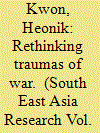

|
|
|
|
|
| Publication |
2012.
|
| Summary/Abstract |
The experience of the Vietnam War provoked, first in the USA and later more broadly, strong clinical and public interest in invisible, psychological war wounds. In post-war Vietnam, however, the traumas of war had quite different meanings. At grass-roots level, these were focused on the sufferings endured by the human soul after tragic or violent death. This article explores the idea that memories of the violent past may captivate and continue to torment the spirits of the dead.
|
|
|
|
|
|
|
|
|
|
|
|
|
|
|
|
| 6 |
ID:
113280
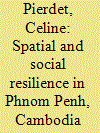

|
|
|
|
|
| Publication |
2012.
|
| Summary/Abstract |
This article assimilates the city of Phnom Penh into an open system that has spread into the Mekong River flood plain with the backfilling of tidelands and the building of successive dykes. The city's hydraulic networks were damaged by the major crisis suffered under the Khmer Rouge characterized by a strong de-urbanization process. Since 1979, the progressive restoration of institutions, in addition to ad hoc interventions in the city's networks by 'pioneer actors', allowed vertical interactions in the city-system between stakeholders and structures to redevelop, and also permitted horizontal interactions between structures. Despite more recent crises, the city-system has proved resilient and it maintains its dualistic kernel-margins structure.
|
|
|
|
|
|
|
|
|
|
|
|
|
|
|
|
|
|
|
|
|